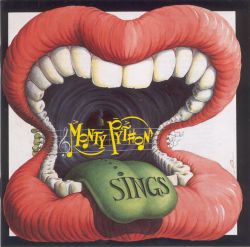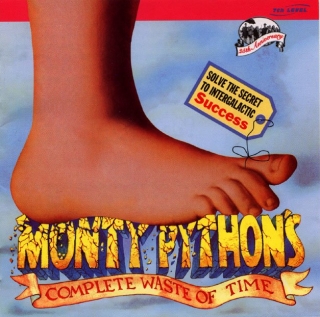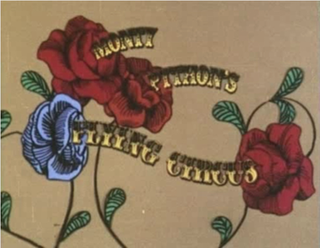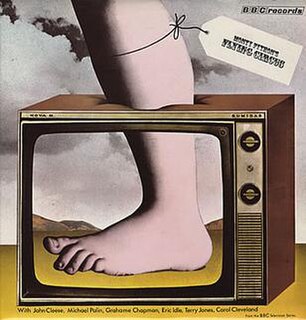This page is based on this
Wikipedia article Text is available under the
CC BY-SA 4.0 license; additional terms may apply.
Images, videos and audio are available under their respective licenses.

The Cheese Shop is a well-known sketch from Monty Python's Flying Circus.

Monty Python Sings is a compilation album of comedy songs by the Monty Python team. Released in 1989 to celebrate their 20th anniversary, it contains popular songs from their previous albums and films.

At Last the 1948 Show is a satirical television show made by David Frost's company, Paradine Productions, in association with Rediffusion London. Transmitted on Britain's ITV network in 1967, it brought Cambridge Footlights humour to a broader audience.
"Piranha Brothers" is a Monty Python sketch that was first seen in the first episode of the second series of Monty Python's Flying Circus. Originally transmitted on the television comedy on September 15, 1970, the premise is a BBC current affairs documentary program, inexplicably entitled Ethel the Frog, retrospectively covering the exploits of the fictional brothers Doug and Dinsdale Piranha. The sociopathic criminals employed a combination of "violence and sarcasm" to intimidate the London underworld and bring the city to its knees. Dinsdale is also described as being afraid of "Spiny Norman", a gigantic imaginary hedgehog whose reported size varied on Dinsdale's mood. During the end of the sketch, which also ends the episode, the creature is apparently revealed as real and appearing beside various English landmarks as the credits roll.

Monty Python Live at the Hollywood Bowl is a 1982 British concert comedy film directed by Terry Hughes and starring the Monty Python comedy troupe as they perform many of their sketches at the Hollywood Bowl. The film also features Carol Cleveland in numerous supporting roles and Neil Innes performing songs. Also present for the shows and participating as an 'extra' was Python superfan Kim "Howard" Johnson.

Monty Python's Fliegender Zirkus consisted of two 45-minute Monty Python German television comedy specials produced by WDR for West German television. The two episodes were first broadcast in January and December 1972 and were shot entirely on film and mostly on location in Bavaria, with the first episode recorded in German and the second recorded in English and then dubbed into German.
"Election Night Special" is a Monty Python sketch parodying the coverage of United Kingdom general elections, specifically the 1970 general election, on the BBC by including hectic actions by the media and a range of ridiculous candidates.
The Monty Python comedy troupe branched off into a variety of different media after the success of their sketch comedy television series, Monty Python's Flying Circus.
Edward Ian Macnaughton was a Scottish actor-turned-television producer and director, best known for his work with the Monty Python team. MacNaughton was director and producer for all but four of the forty five episodes of Monty Python's Flying Circus from 1969 to 1974, director of the group's first feature film And Now for Something Completely Different in 1971 and director of their two German episodes, Monty Python's Fliegender Zirkus in 1971 and 1972. In 1973 the production team shared the BAFTA Award for Best Light Entertainment Programme for Monty Python's Flying Circus.
Monty Python's Lifeboat (Cannibalism) sketch appeared on Monty Python's Flying Circus in Episode 26. It was also performed on the album, Another Monty Python Record, retitled "Still No Sign Of Land". The sketch was inspired by the famous 1884 English criminal law case of R v Dudley and Stephens which involved survival cannibalism among castaways after a shipwreck.

Monty Python's Complete Waste of Time is a collection of minigames, screen savers, desktop wallpaper and icons for Mac OS System 7, DOS and Windows released in 1994 by 7th Level, Inc.

"Eric the Half-a-Bee" is a song by the British comedy troupe Monty Python that was composed by Eric Idle with lyrics co-written with John Cleese. It first appeared as the A-side of the group's second 7" single, released in a mono mix on 17 November 1972, with a stereo mix appearing three weeks later on the group's third LP Monty Python's Previous Record. On this album, the song followed the routine called "Fish Licence" in which Mr Eric Praline, played by Cleese, tried to obtain a pet licence for an halibut and numerous other pets all named Eric, much to the chagrin of the licence office worker. One such pet is half a bee. The song relates the tale of the half-a-bee, having been "bisected accidentally" by his owner one summer's afternoon.
"Never Be Rude to an Arab" is a satirical song by the members of Monty Python's Flying Circus, originally appearing on the 1980 album Monty Python's Contractual Obligation Album. It appears as sung by Terry Jones in the theatrically released concert film Monty Python Live at the Hollywood Bowl and was included on the compilation album Monty Python Sings.
"Decomposing Composers" is a Monty Python comedic song released on Monty Python's Contractual Obligation Album and the Monty Python Sings album. It was written and composed by Michael Palin and arranged by John Du Prez.

Monty Python: Almost the Truth is a 2009 television documentary series in six parts that covers 40 years of the surreal comedy group Monty Python, from Flying Circus to present day projects such as the musical Spamalot. The series highlights their childhood, schooling and university life, and pre-Python work. The series featured new interviews with surviving members John Cleese, Terry Gilliam, Eric Idle, Terry Jones and Michael Palin, alongside archive interview footage of Graham Chapman and interviews with several associates of the Pythons, including Carol Cleveland, Neil Innes and Chapman's partner David Sherlock, along with commentary from modern comedians.

Monty Python's Total Rubbish is a 2014 boxed set collecting remastered editions of the nine original albums of British comedy troupe Monty Python on nine CDs or ten LPs. It was released on 30 June 2014.











